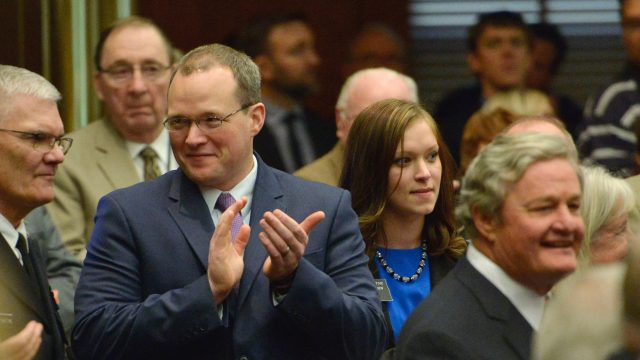National Political Trends Do Not Entirely Explain Why North Dakota Democrats Lost

Senate Minority Leader, Mac Schneider, and Rep. Kylie Oversen welcome Gov. Jack Dalrymple before the State of The State Address on Tuesday, Jan 6, 2015, at the State Capitol in Bismarck, N.D. (Logan Werlinger/Grand Forks Herald)
On election night North Dakota’s Democrats got slaughtered.
They didn’t have a statewide candidate – up to and including Hillary Clinton – crack 30 percent on the statewide ballot. To put that in context President Barack Obama – not exactly a favorite in the Peace Garden State – got 38 percent of the vote in 2012 and 44 percent of the vote in 2008.
Democrats also saw their already tiny Legislative caucus shrink further. They lost a net of 10 seats in the state House and six seats in the state Senate, causing some political wags to speculate to me privately – only half joking – that the Democrats may not have enough lawmakers to fill all of the Legislature’s standing committees.
So why did Democrats lose? Rather conveniently, they’re blaming national politics.
“I think that the biggest factor is what happened nationally deeply impacted our state,” state party chairwoman Kylie Oversen, who lost her seat in the state House on election night, told reporters Mike Nowatzki and John Hageman. “We don’t have many of them, but we do have some deep blue districts, and we even lost those. When things like that happen you recognize that it was out of your control and you regroup and you look toward the future.”
“As a down-ballot candidate, you’re really ice skating uphill when the top of the ticket is faring so poorly,” former Senate Minority Leader Mac Schneider, who also lost on election night, said by way of an excuse.
There is a nugget of truth in this. As Hageman pointed out on Twitter, Trump beat Clinton in some reliably left-wing districts in the state, including Grand Forks area districts 18 and 42 (the latter home to both Schneider and Oversen).
[mks_pullquote align=”left” width=”300″ size=”24″ bg_color=”#ffffff” txt_color=”#000000″]For Democratic leaders like Oversen and Schneider to talk as though they were merely in the thrall of national political trends ignores the fact that historically North Dakotans have no problems with splitting their ballots between political parties.[/mks_pullquote]
But Democrats are glossing over a more fundamental explanation for their losses, which is that their message of supposed Republican corruption and cronyism and give aways to the oil industry isn’t resonating with the public. The people of North Dakota aren’t buying it.
For Democratic leaders like Oversen and Schneider to talk as though they were merely in the thrall of national political trends ignores the fact that historically North Dakotans have no problems with splitting their ballots between political parties.
That happened earlier this year in the Republican primary when Governor-elect Doug Burgum saw a victory over Attorney General Wayne Stenehjem turn into a landslide because of a crossover vote from Democrats. That happened in 2012 when North Dakotans elected Democrat Heidi Heitkamp to the U.S. Senate while voting overwhelmingly for Republicans in every other statewide race.
It happened for years in the 1990’s and early 2000’s when North Dakota voters consistently voted for Republican governors Ed Schafer and John Hoeve, even as they voted again and again to send Democrats Kent Conrad, Byron Dorgan, and Earl Pomeroy to Congress.
Democrats are fond of excusing their election day losses as being the result of blind partisan loyalty to Republicans, but I’m not sure that’s as true as they’d like it to be. There are many voters in North Dakota, enough to win elections with, who would be happy to vote for honest Democratic candidates promising to advance an agenda they agree with. But that’s not what Democrats are offering.
Instead they offer mendacious claims about oil tax reforms which are demonstrably untrue.
They offer political solidarity – sometimes explicitly, other times with their silence – with violent, unlawful #NoDAPL protesters as the Grand Forks Herald notes today. That was almost certainly a factor in Oversen’s race, specifically.
They focus on extreme social agendas that North Dakotans are largely ambivalent about.
They tap as leaders for their party a bunch of young, hidebound, progressive ideologues like Oversen, Schneider, Rep. Corey Mock, and Rep. Josh Boschee who have little in common, politically, with most North Dakota voters.
The last two in that list won re-election, by the way, and are probably in line for leadership positions in the next legislative session. Which will be a sign of Democrats charting a course towards continued irrelevance.




